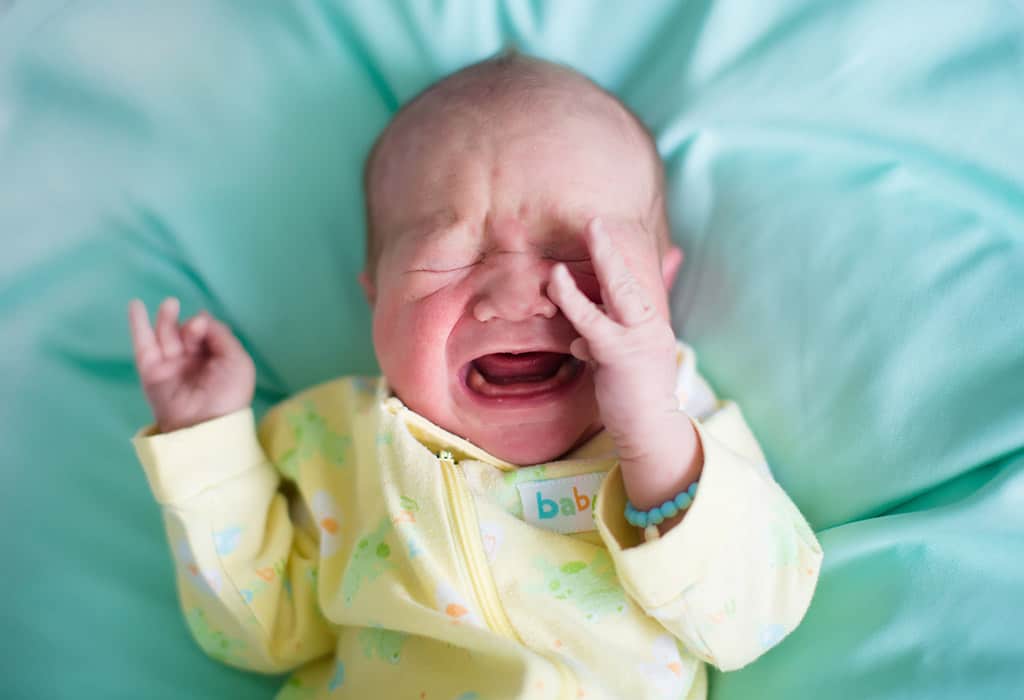
Table of Contents
The risk of dehydration is seen the most in babies as a result of them losing body fluids that are not able to be maintained and function as they are needed to. Some of the warning signs and symptoms of dehydration in babies include drying of the skin, tongue, and lips, fewer diaper wets, rapid breathing, and tearless crying.
What is Dehydration in Babies? - Signs of Dehydration in Babies
Dehydration, as commonly known, is a state of an individual not having much fluid in its body to help carry their function in the best possible manner.
As for babies, their body is made up of 75% water, which is the component of every cell. This is essential as it helps to control the temperature, maintain the functioning of the organ and health of the tissue, carry nutrients to cells, and much more.
Therefore, given the need for the presence of water and its multifunctional use, they tend to lose a lot of water through urination, sweating, bowel movements, breathing, and crying, which needs to be replaced every time they drink or eat. If not, young children can be at risk of dehydration.
In addition to the list above, there are other reasons that could cause the imbalance between depletion and replenishment, causing dehydration in babies. These include vomiting and diarrhea, enabling them to lose more fluid rapidly, causing them to dehydrate.
The Kinds Of Dehydration in Babies - Signs of Dehydration in Babies
Sliding the myth aside, hydration in babies isn’t always about water. Instead, it’s about the sufficiency of bodily fluids and electrolytes, such as minerals like salt to help regulate the balance of the fluid.
Here are the 3 types of dehydration in babies that are mostly seen:
- Hypernatremic or hypertonic, that is the loss of water in the body
- Isonatremic or isotonic, that is the low levels of electrolytes and water
- And, hyponatremic or hypotonic, that is the insufficiency of electrolytes or salts in the body
The Causes and Signs Of Dehydration in Babies - What To Look Out For?
Signs -
Listed below are a few most common signs of dehydration in babies:
- Urine that’s orange or dark yellow
- Dry lips
- Dry mouth
- Constipation
- Excessive sleepiness
- Dry mucous membranes
- Irritability
- Not more than six wet diapers in a day
- Refusing to bottle or breastfeeding
- Has no tears when crying
- Paleness
- Sunken soft spot on their head
- Wrinkled skin
As a matter of fact, little ones are capable of getting dehydrated quicker when compared to adults. This is why it becomes even more important to look out for the signs and be aware of the causes that result in dehydration in babies and the rehydration solution, especially during the nursing strike and when teething.
Causes -
Here are a number of reasons why young children and adults end up being dehydrated. To name a few:
- Issues with breastfeeding: If the baby fails to latch correctly, isn’t breastfeeding enough, or has less supply of breastmilk, there is a chance that they might become dehydrated. (How to increase breastmilk supply?)
- Concerns with bottle-feeding: If babies are not taking the bottle or lack pumped milk, it could cause the baby to dehydrate. (Best breast pumps)
- Have diarrhea: There can be a loss of fluid if experiencing diarrhea with each bowel movement
- Fever: If there is a rise in the body temperature of the child, there can be a loss of fluid, leading to dehydration in babies
- Overexposure to heat: This includes exposure to high temperatures, hot weather, spending too much time outdoors, or extreme humidity. These cause sweating and evaporation of fluids through the skin, leaving the little one dehydrated
- Not eating much: Your baby can get dehydrated if they often refuse breast milk or bottle feed.
- Not well: Including a stuffy nose, sore throat, or earache could interfere in the sucking and swallowing, causing dehydration
- Vomiting: If the baby is unable to keep the food down, they might get dehydrated due to the loss of body fluids
How to Prevent Symptoms of Dehydration in Babies? - Treatment at Home/Doctor's Office, and the Hospital!
Like in any other case, the treatment of dehydration purely depends on the cause and severity of the condition, as well as, the age of the infant. As for newborns or young infants who are under 3 months of age, you can be expected to get the baby to the doctor for a check-up. On the other hand, if it’s a case of prolonged diarrhea or any other illness, the doctor might want to see your baby regardless of age.
That said, it is crucial for parents to make sure to get their little ones checked in case of severe dehydration as it could be dangerous and, at times, life-threatening.
When is it an immediate medical urgency or symptoms of dehydration in babies?
- When the baby seems to be struggling
- Has sunken eyes or sunken fontanelle
- Has diarrhea for more than eight hours
- Is refusing for breastfeeding or bottle-feeding
- Has a fever and is under 3 months of age
- Is constantly vomiting
- Prolonged and/or show severe signs of dehydration
Signs of Dehydration in Babies - What to do at Home?
In case the symptoms of dehydration are mild, here are the things that you can do to treat your little one at home:
- Keep an account of what the baby eats and how many times they leave a wet diaper
- Try and move the little munchkin to a cooler place and remove excessive clothing to prevent overheating
- Slowly offer them breastfeeding to a milk bottle in frequent hours, especially if the baby isn’t eating much
- Make sure they have plenty of fluids and/or drink enough
- Avoid giving your baby an oral rehydration fluid-like Pedialyte, juice, or soda without talking to your doctor first. Adding on, most of these fluids might not be age-appropriate and giving them any kind of wrong liquid could worsen the dehydration.
Signs of Dehydration in Babies - What to Expect at a Doctor's Office?
In case the doctor asks you to bring the little one to their office to get checked, expect an evaluation to determine the best course of treatment.
For instance, if breastfeeding, they might want to check the baby’s latch and the technique of breastfeeding. And if the milk supply isn’t enough, they might advise you to visit a lactation consultant and/or to supplement with infant formula.
Plus, they could also want to examine the child’s overall growth and in case of infection, they might prescribe some medicines to treat it.
Signs of Dehydration in Babies - What to Expect at a Hospital?
Only in case, the situation turns out to be severe, you might be asked to come down to the hospital with the baby.
At the hospital, the doctor would want to monitor the intake of the baby, as well as, their output of fluids (vomiting or diarrhea). The toddlers can also be given IV fluids to help replace the lost fluids, especially if they are not eating well or have severe diarrhea or vomiting.
Plus, in case of any illness or underlying cause, expect them to prescribe some medicines for the little one.
How To Prevent Dehydration in Babies? Final Conclusion
As it is said, the best way of prevention is not to know the signs but to prevent the cause. Here are a few ways to help prevent the signs of dehydration in babies:
1) Frequent Feeding - Signs of Dehydration in Babies
In case of bottle-feeding, try to offer about one to three ounces of formula or pumped breast milk for 2 – 3 hours. On the other hand, if breastfeeding, make sure to feed at least every 2 – 3 hours around the clock.
It’s ok to wake the sleepy newborns up to breastfeed or bottle-feed for more than three hours. As and when the weeks go by and the baby intakes more at each feeding, you’ll notice that they sleep longer between feedings.
Note – Do not pause the feeds to help stop diarrhea or vomiting. In fact, during these times, the baby is in need of extra fluids that can only be completed with their feeds to prevent any illness.
2) Keep Track Of the Wet Diapers and Their Weight Gain - Signs of Dehydration in Babies
It is important to keep track of the number of wet diapers in a 24-hour cycle and go for checkups in case there is a loss in weight gain.
3) Prevent Extreme Heat - Signs of Dehydration in Babies
Dehydration can happen if the baby is when it’s extremely hot or humid. Nevertheless, if it’s really important, make sure that the baby is in the shade, and has applied sunscreen on their hands and feet.
As per health information, babies can easily overheat when inside in a hot, stuffy room or car, or are bundled up. This is why you must try to keep the baby comfortable, continue to breastfeed, have regular fluid intake, and have enough fluids at all times.
4) Avoid Too-Much Water - Signs of Dehydration in Babies
It’s ok to not give your baby enough water between feeds. This helps prevent dehydration in babies, or unless directed by your doctor. The reason as reviewed is that water tends to fill the baby with a lack of nutrients that can be given by either breast milk or formula.
According to the American Academy of Pediatrics, babies must be given water when they are 6 months of age with limited daily consumption of 4 to 8 ounces.
Haven said that, if you think your baby needs to get hydrated, the best way is to carry an extra bottle of formula or breastmilk.
5) Prevent Germs - Signs of Dehydration in Babies
As important as drinking milk is, it’s necessary to make sure that the little ones wash their hands frequently to prevent germs.
This is also true for parents who are preparing the feeds and are changing the diapers. The motto remains the same throughout – Keep your hands sanitized, especially with the onset of COVID- 19.
It’s completely ok to remind your family members and friends to wash their hands before touching your baby. This will prevent any cause of germs and illness (like a cold or any other health problems) in the newborn and young infant.
Dehydration In Babies: Signs, Symptoms, And Tips For Prevention FAQs
1) How to prevent dehydration in babies?
2) What are the signs of dehydration?
3) How to rehydrate a newborn baby?

Nimrat
Dr. Nimrat S Sidhu is a practicing pediatrician for about 5 years now and holds an MD pediatrics degree. She was the topper of her batch, has always had a keen interest in her core medical field, and is specially trained for neonatal resuscitation.
She has published multiple research papers on pediatrics and is interested in topics like Neonatal care, skincare, baby growth, vaccination, growth, and development.






